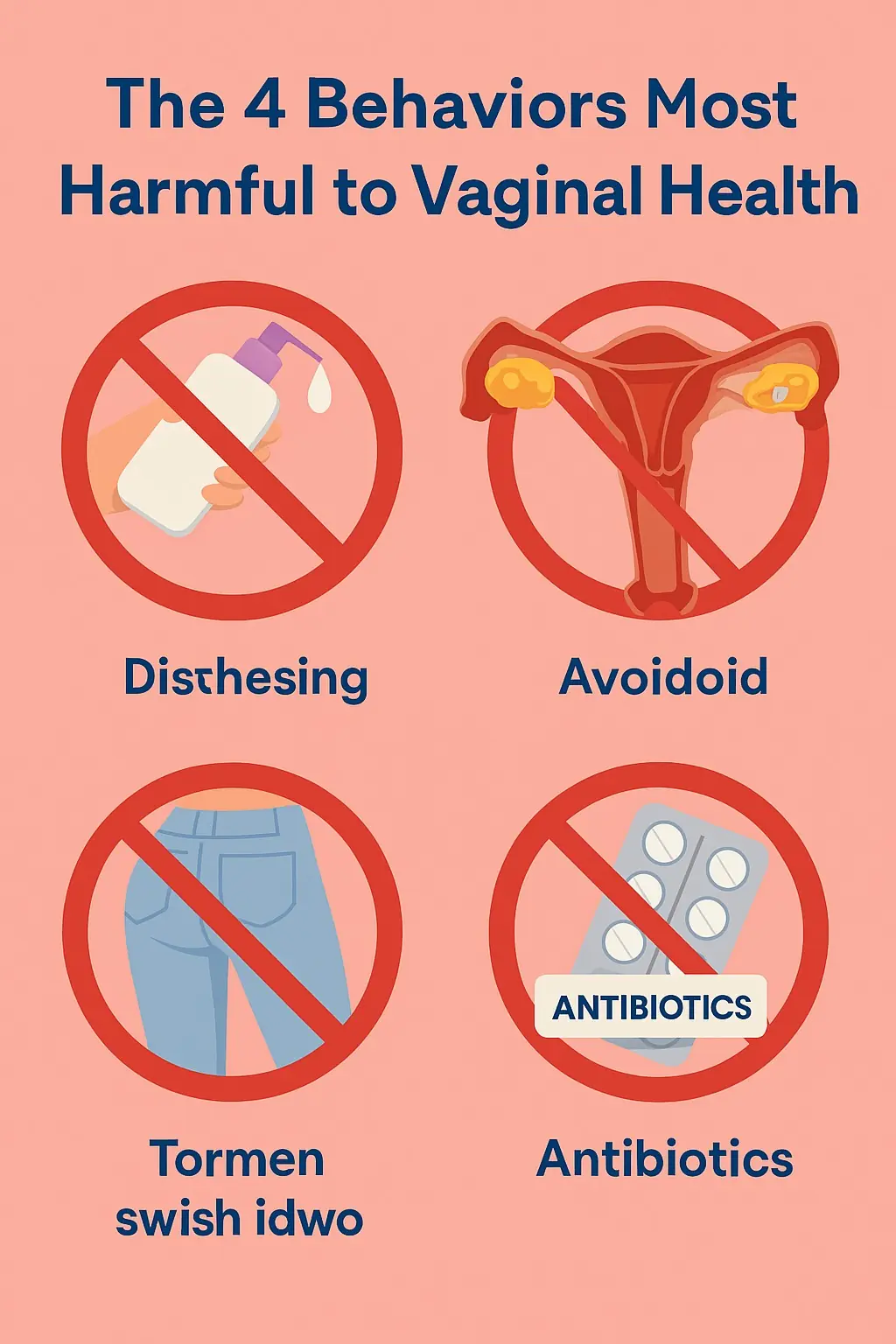
The 4 Habits That Harm Your Vagina the Most – Are You Still Doing Them Often? Stop Immediately After Reading This!

The vagina, as a vital reproductive organ in the female body, plays multiple roles including childbirth, sexual activity, and the discharge of metabolic waste. However, due to its private and sensitive nature, many women often neglect proper care for their vagina in daily life—sometimes unknowingly engaging in habits that do it harm. This article explores the theme: “The 4 Most Damaging Habits to Vaginal Health – Are You Still Doing Them Regularly?”, aiming to raise awareness and guide women toward healthier practices to protect their reproductive well-being.
1. Frequent Vaginal Douching: Disrupting Natural Balance
One of the most overlooked yet common harmful habits is over-cleansing—particularly frequent vaginal douching. Many women, driven by a desire to stay clean or misled by marketing claims, develop the habit of using vaginal wash products. However, this does more harm than good.
A healthy vagina has its own natural micro-ecosystem, home to beneficial bacteria like Lactobacillus. These bacteria produce lactic acid, helping maintain the vagina’s acidic pH (around 3.8–4.5), which suppresses harmful bacteria and forms a natural defense barrier.
Frequent douching, regardless of whether the solution is medicated or not, disrupts this delicate balance. It flushes out good bacteria, raises the vaginal pH, and creates an ideal environment for harmful bacteria to thrive. This increases the risk of bacterial vaginosis, yeast infections, and even pelvic inflammatory disease. Over time, douching can also damage the vaginal mucosa, making it more sensitive and prone to irritation.
Correct approach: Gently rinse the vulva with warm water during daily hygiene. Avoid any vaginal douching products and allow the vagina to maintain its natural balance on its own.
2. Unsafe or Rough Sexual Activity
Sexual activity itself is a mechanical stimulus to the vagina. If performed improperly or too frequently, it can cause physical harm. Rough intercourse may lead to vaginal tears or more severe injuries. Lack of lubrication during sex increases friction, damaging the vaginal lining and raising the risk of infection.
Even more critically, unsafe sex is a direct pathway for sexually transmitted infections (STIs) such as gonorrhea, syphilis, and genital warts, which can severely affect vaginal and reproductive health.
Prevention tips: Be gentle during sex, ensure adequate lubrication, and always use condoms to protect against STIs.
3. Wearing Tight Clothing for Long Periods
Tight jeans and body-shaping underwear may enhance one’s figure, but they can harm vaginal health by trapping heat and moisture. These conditions are ideal for bacterial and fungal growth.
Prolonged wearing of tight clothing can lead to vaginal infections and skin irritation around the vaginal opening, increasing the risk of microtears and infection.
Recommendation: Choose loose-fitting, breathable cotton underwear and avoid wearing tight clothing for long periods. Allow your vagina to "breathe."
4. Misuse of Antibiotics
Antibiotics are effective in treating bacterial infections but can have unintended side effects. They often kill not only harmful bacteria but also beneficial vaginal flora, disrupting the vaginal microenvironment.
Overuse of antibiotics reduces the number of Lactobacillus in the vagina, undermining its acidic environment and increasing the risk of yeast infections and other imbalances.
Guidance: Always follow medical advice when taking antibiotics. Never self-medicate. If you experience vaginal discomfort while using antibiotics, seek medical help promptly.
In Conclusion
Maintaining vaginal health requires mindful daily habits. Avoid frequent douching, practice safe sex, wear breathable clothing, and use antibiotics responsibly. These are essential steps in safeguarding your intimate health.
Regular gynecological checkups are also crucial for early detection and treatment of issues. The more you understand and care for your vagina, the better your overall well-being and quality of life will be.
Vaginal health isn’t achieved overnight—it requires consistent care and long-term attention. Hopefully, this article will encourage women to prioritize their intimate health, correct harmful behaviors, and adopt the right care routines.
Remember: this delicate part of your body deserves thoughtful protection.
News in the same category


“There Are 3 Critical Stages for Diabetics—Overcome Them and You'll Live Long”: What Are These 3 Stages? Pay Attention After Age 50!

Top 10 Healthiest Fruits – Are You Choosing the Right Ones?

Habits That Make Women Gain Weight – Lack of Exercise Is the Least Important, While the Top Cause Is Something Many Do Every Day

Can Taking One Aspirin a Day Prevent Cardiovascular Disease? A Japanese Study Offers an Answer

Is White Radish an “Accelerator” for Nodules? Gastroenterologist Warns: Avoid These 5 Foods If You Don’t Want Nodules to Turn Cancerous

Why Are You Passing Gas So Often? 5 Health Issues That Might Be Behind It – Don’t Ignore the Signs

Is Lung Cancer Contagious or Hereditary? Doctors Reveal the Truth You Need to Know

Think Twice Before Dyeing Gray Hair: Eat These 4 Foods Regularly to Potentially Reduce Premature Graying

Spring Must-Haves for a Clean Bloodstream: The Natural Enemies of Blood Toxins! Keep Your Arteries Spotless and Healthy

Research Reveals: Eating Bananas Regularly Can Bring These 6 Health Benefits to Seniors

Top 5 Fruits for Health and Longevity — Banana Ranks #4, But the #1 Will Surprise You

Why Does Your Body Suddenly Jerk While Falling Asleep — Like You’re Falling? The Reason Might Surprise You

Top 10 Proven Habits to Slow Aging — Sleep Only Ranks #6! The #1 Will Surprise You

Is "Glue-Injected Meat" Becoming a Hidden Epidemic? Digestive Health Expert Warns: Avoid These 5 Types of Meat — Especially for Your Children’s Sake

If these two parts of the body are black, it means that the life span may not be long. Is it true? Listen to what the doctor says

4 Superfoods for Diabetes Management—Affordable Yet Powerful

Sweet Potatoes Are in the Spotlight Again! Doctors Warn: Pay Attention to These Key Points When Eating Them
News Post

WHAT HAPPENS WHEN WE TONGUE KISS…See more

Nature’s Secret: 4 Healing Leaves That Support Metabolism, Immunity & Circulation Naturally

Don’t Drink Coconut Water Before You Know These 11 Secrets!

Pumpkin Seed Milk — The Natural Parasite Cleanser

Fast Rice Water Trick for a Brighter Smile

Morning Drink to Revive Your Kidneys Fast

The Onion Recipe That Could Transform Your Blood Sugar, Support Cleaner Arteries, and Protect Your Heart!

Top 4 Fruits That Help Your Kidneys Flush Out Toxins While You Sleep

Ginger, Clove, and Honey: The Natural Trio Your Body Will Thank You For

Heal 15 Years of Joint Pain Naturally with Turmeric and Honey Tea

This Juice Revived My Grandma’s Energy — Say Goodbye to Fatigue and Body Pain with This Natural Recipe

The Benefits of Eating 2 Boiled Eggs Every Morning: Transform Your Health!

If Your Kidneys Are in Danger, Your Body Will Send You These 8 Signals — Don’t Ignore Them

The Surprising Effects of Avocado on Your Heart and Brain

Ways to Get Over a Man Who Didn’t Value You

I’m 66 but Look 36 — My Secret? Aloe Vera & Ginger for Firm, Smooth Skin

How to Make Okra Water to Treat 17 Health Problems Naturally

Banana and Egg Mask to Look Younger Even in Your 80s

Scent Leaf Secrets Unveiled: 10 Surprising Health Benefits of This Miracle Herb
